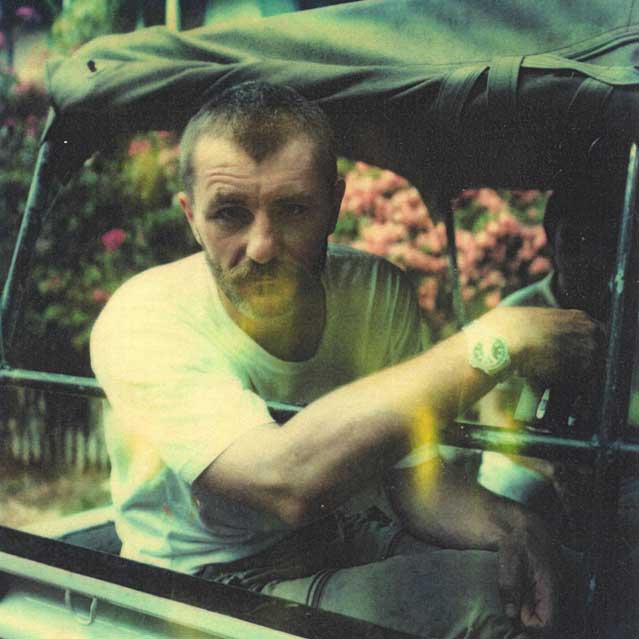When Robert Young Pelton’s was published in 1996, there wasn’t anything like it. (“One of the oddest and most fascinating travel books to appear in a long time,” wrote The New York Times.) Now in its fifth edition, it’s a swashbuckling field guide to the world’s hot spots, laden with refreshingly frank and entertaining anecdotes from Pelton’s extensive travels—“14 wars and 130 countries,” by his count.
Currently, when he’s not vacationing in Kabul, the author, filmmaker, and sometime military contractor is preparing to launch a magazine called Dangerous, which he says will be “kind of like what Soldier of Fortune should have been.” Primarily, however, Pelton divides his time between running , a tactical-knife company, and overseeing , a website he founded to cover piracy and conflict. Pelton is also the only person we know whose business card converts to a shiv. The thin piece of metal has perforated edges that break away to create a small blade—and has yet to be confiscated by airport security.
You’re heading back to Somalia tomorrow. What for?
I’m going to Eyl, a semifamous pirate town on the coast, to do an urban assessment for Somalia Report. We track the locations of hostages and pirate groups 24/7. We want to create GIS maps, then go back three months later, then six months later, and see if there are changes. People always talk about things getting better or worse, but we’re trying to put some metrics behind it.
How many times have you been there?
I’ve been going since 2008 and have made 20-some trips at this point. Last year I sailed aboard a cargo ship from Sharjah [in the United Arab Emirates] to Bosaso [in northern Somalia]. You can hear the pirate attacks on the radio, the captains jabbering away and the Navy people saying, “We’re about a day away, we’ll get there.” I’m trying to get a better idea of what’s really going on, so when I talk about it I’m not blowing it out my ass.
If pirates attacked your ship, who would you want by your side?
You want someone with a hunting rifle, to take out their engines. The poor pirates have about 500 or 600 miles to get back to shore, and most of them can’t swim.
How much has the content of The World’s Most Dangerous Places changed over the years?
People don’t believe me, but there aren’t wars anymore. When I first wrote the book, you had real wars, with tanks shooting at each other. Now there’s more democracy, less dictatorship. The first-edition had 26 countries, and now I’m going to have a hard time covering 12 in the next edition.
What’s fallen off?
Most of Eastern Europe. A lot of Africa. Places like Colombia, where FARC [the Revolutionary Armed Forces of Colombia] is on the tail end of its life. Even Peru, which can be mildly dangerous but is not involved in a war per se. A lot of these countries that used to be holy-shit, ass-puckering places are now sort of like, “Don’t go there,” “Watch out,” “Don’t go out at night.”
So the world is becoming a safer place.
[Laughs.] Yeah, it’s putting me out of business.
But it’s good for the rest of us.
Of course. When I began doing this, if you wanted to find out what was dangerous, you’d look at the State Department travel advisories, which were crap, maybe three lines. There was nothing. Then the Internet came along. Now everybody is an expert on everything. And the other thing is that young people really don’t give a shit anymore. Millennials would rather buy a new iPhone and try the latest cocktail. The most exotic thing they do is change their coffee at Starbucks.
A few years ago, you started offering tourist trips to war zones.
A guy from Switzerland and I set up tours to meet rebel groups, the idea being that we’d go to both sides. No hotels, no trekking. The plan was to actually walk up to the front line, with people shooting at you. But nobody wanted to go. The only inquiries came from the media.
We’re not as adventuresome as a society anymore.
Absolutely. I used to say that adventure was the cheap cologne of the '90s, because everybody would dress like war correspondents. Now it’s not even cool to talk about exotic places, because it’s like, Oh, you’re going to get kidnapped or killed or blown up. We’ve lost the sense of magic that drove the 18th-century explorers.
How did you turn your fascination with danger into a career?
Until I was in my mid-thirties, I worked for creative companies and did product launches. But every year I’d take a month off. I’d find those white spots on the map and plunk myself down in the middle of Borneo or Africa. I’d meet journalists on those expeditions, and I became intrigued by the idea that there were still areas where, if you go there, you’d get killed.
You’ve spent a lot of time working with military types but don’t have a military background yourself. How did you develop such strong relationships with them?
All these Special Forces guys, they’re like, Hey, when I was a kid I read your book. So I have this huge fan base. Unfortunately, it’s all old men. Plus, you’ve got to remember, war is a very casual environment for me. So I think they take comfort in the fact that (a) I respect what they’re doing, and (b) I know what I’m doing.
Do you ever get wigged out?
It can get scary, but certain types of people can handle it. I call it the fireman complex. If there’s a fire in the building, certain people run in and certain people run out. So if you’re one of those run-in people, you’re cool. But if you’re one of those run-around-with-your-hands-in-the-air-screaming people, you’re not cool.
Is there any way to tell when someone’s packing heat?
People have to pull a weapon out to use it, and they don’t want you to grab it. So if you meet someone and they’re always keeping a 20-foot buffer, that’s a red flag—you should be backing away.
Do you ever carry a gun?
I don’t carry weapons, but I carry men who carry weapons. That’s really the key. It’s like those Mexican standoff movies. You can pull a gun on me, but if 24 guys pull a gun on you, you’re not gonna kill me. It’s very cinematic, but that’s how it works.
Is there still somewhere you’re dying to go?
I’ve never made it to Sri Lanka, which is supposed to be really beautiful. I’ve always wanted to go to the Comoros, off the coast of Madagascar. The really cool thing is that truly wild places still exist. Places where they call sharks and people dive off cliffs. Like Somalia. I stand on the beach in Somalia, and there’s nobody there for 150 miles in either direction.


